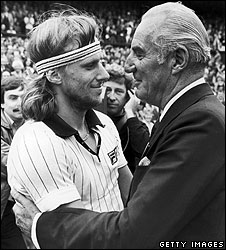
Perry woos actress Marlene Dietrich in Palm Springs, 1934
|
By Peter Jackson
BBC News
|

Britain has longed for a home-grown Wimbledon men's singles champion for decades - but what do we know of the last man to have held this title? If Andy Murray reaches the Wimbledon final on Sunday, he'll do so wearing the famous logo of his sponsor - one Fred Perry. Some might say an albatross would be a more appropriate emblem than the laurel leaf logo, such is the level of desperation among British fans for the Scot to emulate the 1930s legend.

Perry's achievements loom large at the Wimbledon championships
|
Few people who have been following Murray's progress can fail to know the name Fred Perry, but few would recognise his face. And his colourful and controversial life off the court matched his achievements on it. According to The Last Champion, the first and recently released biography of the star, Perry dated some of the world's most beautiful women, including Marlene Dietrich and Jean Harlow. Author Jon Henderson says: "He was an extremely good looking, red-blooded lad. The girls liked him and he liked the girls, it went from there. "One US columnist said 'women fell for him like ninepins and when he went to Hollywood, male film stars went and sulked in Nevada'." The pipe-smoking player's close friends also included Bette Davis and Clark Gable's former lover Loretta Young, and each of his four wives were part of the "glitterati".
 |
GAME, SET, MATCH: PERRY
Six feet tall, 12 stone, right-handed
World table tennis champion at 19
Wimbledon winner 1934-1936
Eight-time Grand Slam champion
Launched clothing range in 1950s
Born 18 May 1909, died 2 February 1995
|
On one occasion in Boston, Perry and a US tennis player scrambled down the outside of a hotel on sheets they had tied together, in order to drop in on two female players. The high life he enjoyed in later years seemed a long way from his origins. Born in 1909 in Stockport to a local cotton spinner, Perry moved to Ealing in London aged nine when his politically-minded father became the national secretary of the Co-operative Party. It was a move that gave Perry his first taste of tennis, on the courts of his family's housing estate. But it was a long way from the clipped lawns of Wimbledon's All England Club and a sport dominated by public school boys - one he struggled to gain acceptance into, despite becoming world table tennis champion at 19. "The fact he was an outsider helped rather than crushed his spirit, he used it to motivate himself," says Mr Henderson. "When he was told he couldn't do something, it made him more determined." Sleeveless sweater He was once barred from entering a tournament because he didn't go to a public school, so he turned to a fellow player to ask where they went, and when they replied "Repton School", he turned back and brazenly told the official: "All right, I went to Repton". When he beat Australian Jack Crawford in his first Wimbledon final - Perry won three in total - a club official gave his bottle of champagne to the loser. Lying in a bath, Perry overheard the official saying Crawford was a "better man".

He often returned to Wimbledon before his death in 1995
|
Later, when he turned professional, an official from the International Lawn Tennis Club of Great Britain wrote to him saying he should never wear the club sweater again. Perry sent him a sleeve "as a present" to make his feelings known. Disillusioned by the establishment, Perry headed to the classless climes of the United States. He took US citizenship not long afterwards and started making money on the tennis circuit in his adopted country. He was called up in 1942 and served in the US air force during the war. Perry was pushed forward by his own confidence and single-mindedness and usually with a twinkle in his eye, Mr Henderson notes. His mastery of table tennis had come about teaching himself at a local YMCA and practising for hours against a kitchen table up against the wall. He also trained with Arsenal Football Club during his amateur tennis days to focus on his fitness, a highly unusual move at a time when few players bothered to train in that way.
 |
 Over the years the British ineptitude at tennis has really exaggerated his importance Over the years the British ineptitude at tennis has really exaggerated his importance 
|
Perry would go on to become one of the world's first truly international sportsmen, the first player to win the four major tennis titles. In all, he was an eight-time Grand Slam champion. Britain's most successful player was also unafraid to inflict "psychological warfare" on his opponents, something he himself called "surreptitious gamesmanship" later in life. When playing in his second Wimbledon final against the famously fastidious Gottfried Von Cramm, Perry took the lining of his trouser pocket out because he knew it would drive his German opponent mad. On another occasion in Australia he had his racket painted bright white to distract his opponent, and he would regularly jump over the net at the end of a match to show he wasn't tired. Perry launched his famous polo shirt at Wimbledon in 1952 and it was an immediate success. The laurel logo was based on the old Wimbledon symbol and unlike other logos it was stitched into the shirt. It became fashionable in the 1970s and has been a big seller ever since.

The Perry polo shirt is back
|
His clothes have ensured Perry's cultural importance is immeasurably bigger than his sporting importance, says Ellis Cashmore, author of Celebrity/Culture. "This guy has been rehabilitated over the years and he's more popular today than he was in his own day. In a sense this is similar to Muhammad Ali, whom we think of as the all-conquering hero of the 20th Century. "But look more deeply into his background and you'll see that when he got the world championships and changed his name he was widely despised for affiliating with Nation of Islam, a sectarian group." Fred Perry's name has been revived in a similar way, says Mr Cashmore. Tennis was elitist and not a major sport until television took an interest, which meant that he was never a popular hero in the same way footballers were.

Glamour and glitterati: Perry married four times
|
Plus there was the controversy of him turning professional and taking American citizenship, he says. That has now been forgotten, mainly due to the paucity of great male tennis players since, but also thanks to the adoption of the Fred Perry clothing brand in popular culture. "Over the years the British ineptitude at tennis has really exaggerated his importance. Fred Perry polo shirts were very popular in the 1970s when skinheads took to them. They were even abbreviated to "Freds". "But the people that wore these probably never knew Fred Perry the tennis player. And if you showed 20 people a picture of him, just his head and shoulders, none of them would know who he was." In recent weeks, bands like Blur, The Specials and Gwen Stefani have ensured that the Fred Perry brand is back in the mainstream. So whether or not Murray ever consigns Perry to history by emulating his Wimbledon achievement, the laurel leaf will ensure his name lives on.
A selection of your comments appears below. The most astonishing feature of this story is that Jon Henderson's book really is the first biography of Fred Perry. How could he be ignored for so long when so-called icons such as Ronaldo, Rooney, even Andy Murray, have whole libraries written about them in their early twenties?
John Bendix, Newcastle Nice article. However on Fred's migration to the States, tennis was certainly not a class-free sport over there. On the contrary, it was dominated by 'preppy' types from the better schools and universities. Fred would have struggled to have made any headway had he grown up there. He was however welcomed as a British celebrity, and so was presumed to be 'the right sort'. Interestingly the Fred Perry clothing range has a very 'preppy' look, a big part of its charm.
Philip, Cambridge Great article. I'm not sure the bloke above understands the resons why people buy brands. Personaly I like Fred Perry even more now that I know why he left the uk and became a US citizen. This country is still stuffed full of snobs.
Michael, Bracknell What an interesting article about a true hero! My son wears Fred Perry apparel and whilst I knew Fred to be a tennis hero, your article highlights very interestingly how a working class man made it to the top and in so doing enjoyed his life to the fullest, ignoring all the toffs and the privileged who felt that life was only for the upper few! Thank you for this article! Long Live Fred Perry!
DKP, London, UK Totally agree with DKP! Perhaps the reason we haven't had a men's singles champion since is that the toffs have worked twice as hard to ensure his like don't get a chance again.
Norman Peacock, Birmingham What an interesting article. I've long felt that the lack of success for British tennis players is due to the class-consciousness of the tennis clubs themselves and the lack of opportunities for most young children to play the game. It's fascinating that Fred Perry experienced the same sort of attitudes in his lifetime and I'm sure he would recognise excatly thes attitudes from the administrators of the professional game today in the UK.
Martin Hatter, Bristol, UK My father, the late Mr S Narayan, who was born on 30th Aug 1911, met Fred Perry in London. My father passed away in 1981 aged 70. He was always in praise of Perry and his tennis and I look forward to Andy Murray to carry this legacy, a Scot winning the glory for UK not England only.
Gagan Dua, New Delhi, India Fred Perry's enduring contribution to British tennis success stands in stark contrast to how difficult it is today for British youngsters to succeed in this remarkable sport.
Philip Johnson, Columbia, Missouri, USA Fred Perry was born in a house just round the corner from mine. Today it has a blue plaque on it recording the event. I wonder how many young people who pass on foot or on the bus in their Fred Perry sportswear are aware of the fact, or ever connect the logo on their polo shirts with the Fred Perry way in the town.
Geoff Thomason, Stockport, Cheshire Fred Perry seemed elegant and stylish, things that most of us can still appreciate today.
Karl Chads, London, UK
|

~RS~q~RS~~RS~z~RS~34~RS~)

~RS~q~RS~~RS~z~RS~34~RS~)
Bookmark with:
What are these?